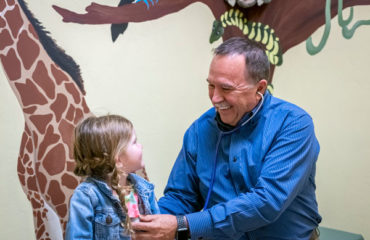
Dr. John Bean Answers the Most Frequently Asked Questions by New Parents on What to Expect After You Take Your Newborn Home.
 When is the first office visit?
When is the first office visit?
The first office visit with your pediatrician will occur between three and five days of age. At this visit we check the baby’s weight (weight loss is common in the first few days of life), feeding schedule and mother’s milk production if breastfeeding. We check your baby for jaundice which is quite common in newborns in the first weeks of life. Most infants will have mild degrees of jaundice but if more severe it may require further evaluation and occasionally treatment. A general physical examination will be done at this visit and we will discuss how everyone is adjusting to the newest family member. This visit also provides an opportunity for parents to ask questions of me and my staff. Questions are welcomed in our office to ensure adequate and appropriate information is shared about the newborn and the important transition that is occurring at this time. A second visit will be set up for approximately 2 weeks of age and a complete examination will be done. Most babies at this age will be at or above their birth weight if feeding has been well established.
What is the immunization schedule?
We recommend the first Hepatitis B vaccine in the hospital after delivery. The next set of immunizations will be at the 2, 4 and 6-month checkups. There are a multitude of immunizations that will be discussed at these visits. Fortunately, some are combined into a single injection and one of the newest vaccines is given orally. These series of vaccines are called the primary series. There are more immunizations between 1 and 2 years and beyond that will be discussed and scheduled as the baby grows. At each of these well-baby checkups a complete examination with particular attention to the infant’s growth and development will be performed. Common areas of discussion center on feeding, sleeping and infant behavior and development.
Do you provide preventive guidance?
Absolutely. We include discussions on what to anticipate between visits and provide guidelines for sleeping, feeding and the developmental milestones to look for. Much of pediatrics is devoted to prevention and early identification of problems. Every visit should include some discussion and transmission of information regarding what to expect prior to the next visit. Sleeping is a good example – often by counseling parents on what the normal variation in sleep is like and recommending age-appropriate interventions, good sleep patterns can be established early. One thing to always remember is that every baby and every family is different and recommendations will vary. We think it is very important for a pediatrician to be flexible in making recommendations that will be best for each individual family.










You must be logged in to post a comment.